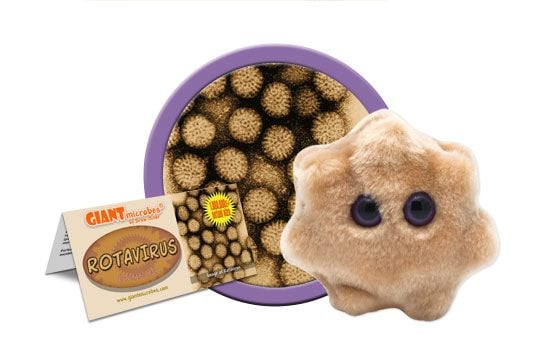Rotavirus (Rotavirus)
Product Details
Additional Information
| Sizes | Giantmicrobes are based on actual microbes, cells, organisms and other critters, only 1,000,000 times actual size! Gigantic (GG) 16-24" XL (XL) 10-15" Original (PD) 5-8" Keychain (KC) 2-4" with clip |
|---|---|
| Materials | Plush from all new materials. Stuffed with polyester fiber fill. Surface washable: sponge with water & soap, air dry. |
| Packaging | Each plush microbe includes a printed card with fun, educational and fascinating facts about the actual microbe or cell. |
| Safety | Every product meets or exceeds U.S. and European standards for safety. For ages 3 and up. |
All about Rotavirus (Rotavirus)
FACTS: Rotavirus (or “wheel” virus in Latin, after its microscopic appearance) is one of the most common viral infections among young children. Indeed, nearly all children are thought to have had the disease at least once by the time they are 5 years old.
Its signature symptom is severe diarrhea, often accompanied by fever and nausea – and it is often called “stomach flu” (though it is not related to the flu virus).
It is spread orally and via fecal matter, typically distributed via changing tables or poorly washed hands. Although it normally causes symptoms for 3-10 days, it can remain contagious for up to 12 days after the onset of diarrhea. As a result, it is often transmitted in child-care settings, when children return prematurely after experiencing a bout with the disease.
Dehydration is the primary danger that sufferers face; low energy, dry mouths, and sunken eyes are signs that dehydration is becoming severe. (In infants, sunken soft spots and dry diapers are also indicative.) In such cases, hospitalization is required, so that fluids can be administered intravenously. And it is imperative that help be sought immediately: in remote areas where proper treatment facilities are inaccessible (particularly in developing countries), rotavirus is a leading cause of mortality among children.
Fortunately, vaccines are now available which are already reducing incidences of rotavirus – and taking this wheel of ill-fortune off the road.
| Name | The name rotavirus comes from the circular shape of the virus, and the Latin: rota=wheel. |
|---|
| Where It Lives | Infected people release rotavirus in their feces. Others become infected through contact with contaminated surfaces and ingestion of the rotavirus. Children are the most susceptible, so this would be a great gift for a pediatrician! Although this critter is adorable, it offers a warning to children about washing their hands. |
|---|
| Symptoms | Diarrhea, fever, stomach pain, vomiting, and dehydration. The symptoms last for 3-8 days. |
|---|
| Cure | Vaccines for infants are taken in multiple doses. There are no medications that work on the virus, but it will go away on its own. Drink fluids to prevent dehydration. |
|---|
| History |
1973: Ruth Bishop discovered the rotavirus from her work at a children’s hospital in Australia. 2006: Merck makes a safe rotavirus vaccine. Big Outbreaks: Rotavirus is a constant problem worldwide. However, vaccines created in the 2000’s have drastically reduced infection rates. In the U.S., the vaccines more than halved annual rotavirus hospitalizations. Recent Outbreaks: 2011: Two retirement communities in Illinois had rotavirus outbreaks where a total of 30 people were hospitalized. |
|---|
| Fascinating Facts |
It is the most common cause of infant and child diarrhea. This is a big problem in developing countries where dehydration is a major cause of child death. In one year, about half a million children die from rotavirus. The risk of contracting rotavirus is greatest in the winter and spring. |
|---|






